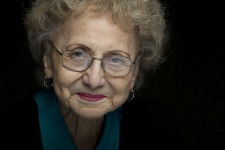When our class hosted the three Tlingit elders this afternoon, one particular comment by Elder Selina Everson really struck me as worth thinking about. She made a comment about the Presbyterian missionaries that ran something like, “they thought that what they were doing was good, that they were helping us.” And, in context, this “help” that she spoke of was primarily about bringing in Protestant Christianity, Western culture, and the English language. Of the three, she really only deeply addressed the last of these in her talk.
However, it was clear, in her later-life analysis, that the missionaries attempt to suppress Tlingit as a language had left a deep, lasting, and painful wound in her soul. Of course, it was about more than simply the destruction of language, it was about the intentional attempt to destroy a way of life through education. By her account (and by mine), the suppression of Tlingit was wrong and evil, however good the intentions of the missionary teachers may have been.
But this, I think, should give us pause, when we think about going out to teach. All of us have agendas. All of us have axes to grind. All of us have ways that we wish the world were different. And part of the way we’re going to try to make the world different, to “make a difference,” is through our work as teachers. But what if, in spite of our all good intentions, we actually end up doing serious harm to the communities and students we serve?
I think one of the things I will take away from the presentation of the Tlingit Elders is that we need to be very circumspect. The task of teaching is noble and worthwhile, but we need to be very thoughtful (even philosophical) about what we’re doing. The Presbyterian teachers surely felt that they were enacting “progressive social change” in Native communities by attempting to assimilate them to broader American culture. They could potentially talk about all sorts of things like greater access to education, higher standards of living, greater access to technology, etc. that could all be achieved if only the Natives would embrace English as their language and a Western style of life.
I think one of the greatest problems with what was done to the Tlingit is that the suppression of their language was not voluntary or the result of a gradual, natural social process. Instead, it was something imposed on them from without. We should understand, as future public school educators, that what we are about to undertake is not a matter of individual parental or community volition; schooling is mandatory in the United States and parents will be punished severely if they don’t buy in. This puts teachers and school officials in a position of serious social power, and this power can be used for great good or great ill. If we’re not careful and circumspect, we can inflict serious harm on those we intend to help.




